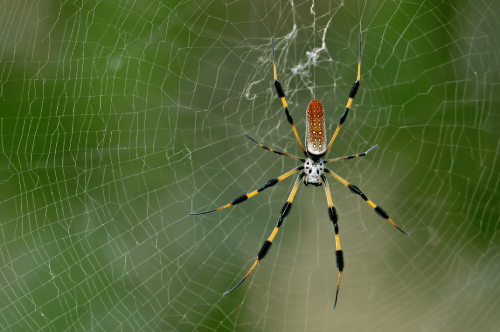
Banana spiders may sound like a joke, but they aren’t. The term banana spiders includes several different spider species that can be found in certain tropical regions around the world. Learn more about banana spiders, what they look like, where they live, and if they are dangerous, so you know what to do if you find them in your home.
What are banana spiders?
Banana spiders get their name because they’re often found on banana shipments that come from tropical regions or because they are easily identified by their often bright yellow coloring and long, spindly legs. It’s important to note that banana spiders are not only one type of spider; this moniker actually refers to many different types of spiders.

The six most common types of banana spiders are:
- Red-faced banana spider: This spider has red hairs on its mouthparts and brown furry bodies.
- Golden orb weavers: These types of spiders that include garden spiders and Argiope spiders produce wheel-shaped webs, some with signature markings.
- Hawaiian garden spider: Imported to Hawaii, this spider camps out in low-sitting plants to the ground.
- Brazilian wandering spiders: One of the deadliest spiders on Earth, they belong to the genus Phoneutria, which means “murderess” in Greek.
- Goblin spiders: 1–2mm in size, these small spiders live in rainforests in China and have eyes so tiny they’re barely visible.
- Nephila Clavipes or Golden Silk Spiders: Nephila clavipes is a large size and brightly colored species of the orb-web spider family. Nephila comes from Ancient Greek, meaning fond of spinning. Most people call them banana or golden silk spiders, but other common names are calico spider, giant wood spider, golden silk orb weaver, and writing spider. The golden refers to the color of the silk, not the color of the spider; the web of a mature female has yellow threads that look like gold in the sunshine.
Their iconic, intricate, golden-colored webs are also incredibly strong—5 times stronger than steel and as flexible as nylon.
How big are banana spiders?
While there are different kinds of spiders under this category, the average female banana spider can grow to 1–3 inches (average males are considerably smaller, usually topping out around ½ an inch). Some species’ leg spans (like the giant wood spider) can be up to nearly 8 inches (20cm) long.
Where do banana spiders live?
Banana spiders, also known as golden orb spiders, thrive best in warm, tropical climates, like certain parts of North America, Australia, Asia, and Africa.
In North America, you might find banana spiders anywhere between Texas and North Carolina. And in this region, you’ll likely be meeting the nephila clavipes—a banana spider with females that range between an inch and an inch and a half in length. They lay their eggs in a sort of “golden basket” nest.
What do banana spiders eat?
Banana spiders can feast on any insect that is smaller than they are, including flies, moths, bees, and wasps.
How long do banana spiders live?
Just as their full-grown size differs between males and females, so do their lifespans. Females can live up to a month, while males make it to roughly 2–3 weeks after their last molting before dying. After hatching, the spiderlings molt many times before becoming mature enough to reproduce and start their own brood.
Are banana spiders dangerous?
Bites from most banana spiders typically only cause pain and irritation at the site of the bite. Again, the effect of the bite is determined by the particular banana spider you come across, as some breeds are much more aggressive and dangerous than others.
Tips to deter banana spiders
There are some easy steps you can take to mitigate the effects of a banana spider infestation until a pest control specialist can assess it and help you.
Try these tips to get rid of banana spiders in your home:
- Remove all uneaten food and crumbs from your kitchen and eating areas
- Keep outdoor lights turned off at night
- Seal up any cracks in your home where spiders could get in
Call Hawx Pest Control if you have concerns. We will help you discover the best treatment options for your situation.
Categories
RELATED POSTS



